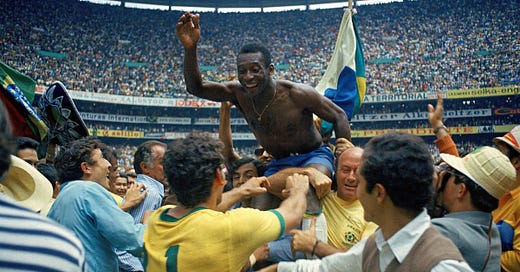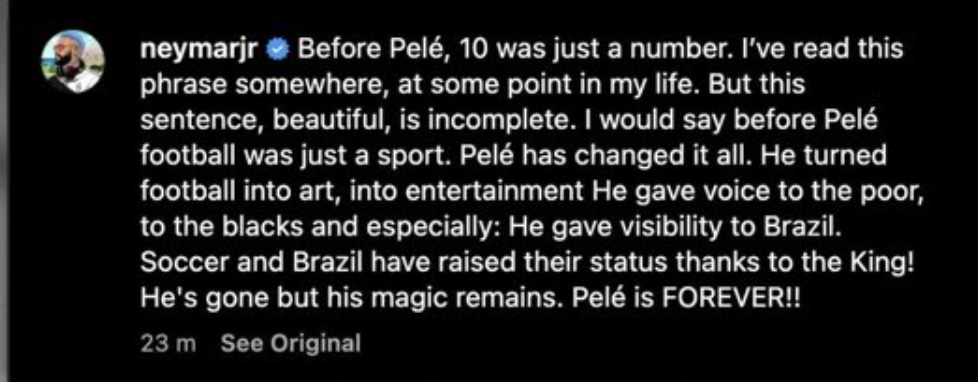Edson Arantes do Nascimento, better known as Pele, has sadly died at the age of 82 and the footballing world is mourning the loss of one of its all-time greats.
This isn’t going to be a long piece because my words mean very little when it comes to properly honouring one of the greatest footballers of all time, but regardless I want to add my voice to the millions of others who are paying their respects.
Before I continue, I want to stop and say my condolences go out to his friends and family. We are all mourning the loss of a sporting icon; they have lost something so much more.
I never watched Pele play live (I mean I’m 24 so you could have assumed that) nor did I really watch any footage of him till recently.
If we’re being perfectly honest until a couple of years ago the only footage I’d seen of this great Brazillian on a football field was in the 1981 film ‘Escape to Victory’.
But the thing about Pele was his reputation and legend proceeded him. You didn’t even need to see a second of him playing to know what he meant to Brazil or the sport.
Only Diego Maradona’s reputation in Argentina could compete with how Pele was thought of in Brazil.
He had already written his name into the history books at the age of 17, winning his and Brazil’s first World Cup in 1958. Pele described it as the ‘nation’s coming of age’, a more apt description would have been the start of a dynasty.
Two more World Cups followed in 1962 and 1970 and Pele played a pivotal role in all of their victories. He remains the only player to win the competition three times.
But this isn’t the only reason why Pele’s name will live on in the hearts of many.
The adage goes: “A society grows great when old men plant trees in whose shade they know they shall never sit.” Pele was one of the lucky few whose trees grew much faster than the rest.
24 years after Brazil won the World Cup in 1970, they would finally win it again in 1994 and then follow it up with another victory in 2002 after losing in the final to France in 1998.
For many of the players who donned the famous yellow of the Selecao, watching Pele or the stories they had been told of his greatness was their inspiration.
Cafu, who captained the side that won the World Cup in 2002, told FIFA:
“Pele revolutionised football. Pele stopped a war. Pele united countries, united families. There was no race problem, language problem. I was born in 1970. In 2002, I became a world champion. I was captain. I had the honour of receiving the World Cup Trophy from no less than whom? Pele! Man! If I say any more I’ll cry. It’s really emotional!”
This, alongside the hundreds of tributes you will likely see on social media over the next few days, shows just how much Pele meant to the sport.
I could try to fully describe the way he played, but I think Brian Phillips put it best in his most recent instalment of 22 Goals: “It’s because of him that we talk about soccer as the beautiful game.”
And if that’s not enough here’s a short video that does its best to visualise what Brian tried to put into words - Whatever your favourite footballer did, Pele did first:
So now we unfortunately must say goodbye to one of the greatest players to ever grace a football field.
I can’t speak with the love of a Brazillian, nor with the admiration of a fellow person of colour for what he did to overcome racism in the 1950s with his talent, but I can speak as a football fan.
My love for the sport can find its roots with Pele; from the players I have enjoyed such as R9 and Ronaldinho, to the creativity and inspiration of ‘Joga Bonito’ that many try to replicate.
In some ways, even the tactics that now play such a big role in the way the game is played, stem from managers trying to find ways to stop the unstoppable.
Every offhanded flick or expression of skill somehow finds its way back to him; channelling the spirit of individualism he showed whenever he laced up his boots and stepped onto the pitch. Nelson Mandela put it best when he said:
"To watch him play was to watch the delight of a child combined with the extraordinary grace of a man in full.”
He revolutionised the sport and inspired generation upon generation to play the game in whatever way they can. Whether it be professionally or even just a couple of kids kicking a can around on an empty street.
So we return to the saying: “A society grows great when old men plant trees in whose shade they know they shall never sit.”
Pele saw some of the fruits of his labour as the sport grew and flourished, but his legend will see to it that even now after his passing, the seeds he planted long ago will continue to branch out and become something much greater than he ever could have dreamed.
He will continue to be one of the players we measure all others against; a marker of true greatness.
For that, we can only say thank you to Edson Arantes de Nascimento, or as he will forever be known, Pele and end on a quote from Andy Warhol:
“Pele was one of the few who contradicted my theory: instead of 15 minutes of fame, he will have 15 centuries.”






